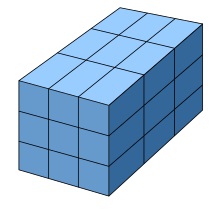This article needs additional citations for verification. (December 2009) |

A regular grid is a tessellation of n-dimensional Euclidean space by congruent parallelotopes (e.g. bricks).[1] Its opposite is irregular grid.
Grids of this type appear on graph paper and may be used in finite element analysis, finite volume methods, finite difference methods, and in general for discretization of parameter spaces. Since the derivatives of field variables can be conveniently expressed as finite differences,[2] structured grids mainly appear in finite difference methods. Unstructured grids offer more flexibility than structured grids and hence are very useful in finite element and finite volume methods.
Each cell in the grid can be addressed by index (i, j) in two dimensions or (i, j, k) in three dimensions, and each vertex has coordinates in 2D or in 3D for some real numbers dx, dy, and dz representing the grid spacing.
- ^ Uznanski, Dan. "Grid". From MathWorld--A Wolfram Web Resource, created by Eric W. Weisstein. Retrieved 25 March 2012.
- ^ J.F. Thompson, B. K . Soni & N.P. Weatherill (1998). Handbook of Grid Generation. CRC-Press. ISBN 978-0-8493-2687-5.

